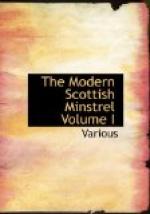By bog, and rock, and hollow, then,
And nestle in the gulley, then,
And watch with deep devotion
The shadows on the benty grass,
And how they come, and how they pass;
Nor must he stir, with gesture rash,
To quicken her emotion.
With nerve and eye so wary, sir,
That straight his piece may carry, sir,
He marks with care the quarry, sir,
The muzzle to repose on;
And now, the knuckle is applied,
The flint is struck, the priming tried,
Is fired, the volley has replied,
And reeks in high commotion;—
Was better powder ne’er to flint,
Nor trustier wadding of the lint—
And so we strike a telling dint,
Well done, my own Nic-Coisean![123]
[109] Anglicised into Ben.
[110] The deer.
[111] Stag of the first head.
[112] Pass.
[113] Any one who has heard a native attempt the Lowland tongue for the first time, is familiar with the personification that turns every inanimate object into he or she. The forest is here happily personified as a nurse or mother.
[114] Bog-holes.
[115] Stripings.
[116] Gaelic—Easan-an-tsith.
[117] Primrose.
[118] St John’s wort.
[119] A kind of cress, or marshmallow.
[120] Anglice—dark.
[121] Gaelic—Caoillt; who, with Cuchullin, makes a figure in traditional Gaelic poetry.
[122] Gaelic—King George.
[123] Literally—“From the barrel of Nic-Coisean.” This was the poet’s favourite gun, to which his muse has addressed a separate song of considerable merit.
THE BARD TO HIS MUSKET.[124]
Macintyre acted latterly as a constable of the City Guard of Edinburgh, a situation procured him by the Earl of Breadalbane, at his own special request; that benevolent nobleman having inquired of the bard what he could do for him to render him independent in his now advanced years. His salary as a peace-officer was sixpence a-day; but the poet was so abundantly satisfied with the attainment of his position and endowments, that he gave expression to his feelings of satisfaction in a piece of minstrelsy, which in the original ranks among his best productions. Of this ode we are enabled to present a faithful metrical translation, quite in the spirit of the original, as far as conversion of the Gaelic into the Scottish idiom is practicable. The version was kindly undertaken at our request by Mr William Sinclair, the ingenious author of “Poems of the Fancy and the Affections,” who has appropriately adapted it to the lively tune, “Alister M’Alister.” The song, remarks Mr Sinclair, is much in the spirit, though in a more humorous strain, of the famous Sword Song, beginning in the translation, “Come forth, my glittering Bride,” composed by Theodore




